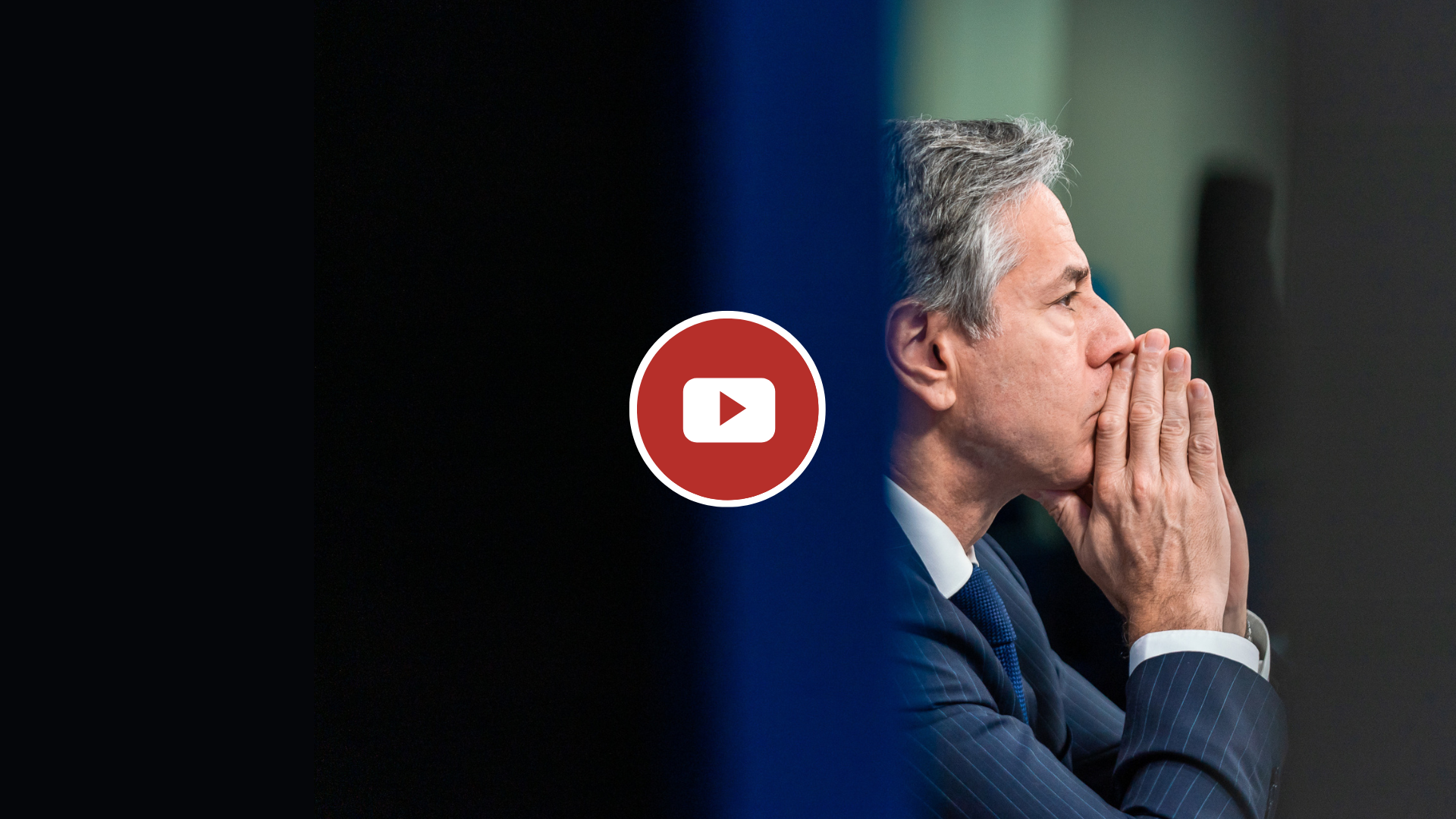From June 18-19, Secretary of State Antony Blinken will visit China for meetings with high level officials in a bid to stabilize U.S.-China relations and re-establish regular diplomatic communications. After a similar trip was postponed earlier in 2023 due to the unauthorized entry of a suspected Chinese surveillance balloon into American airspace, all eyes will be on the U.S.-China diplomatic relationship.
Veteran diplomat Susan A. Thornton joins the National Committee to discuss why Secretary Blinken’s trip is so important at this moment and what a positive outcome of this meeting would look like for the United States, China, and the world.
Transcript
SUSAN A. THORNTON: Hi, I’m Susan Thornton and I currently work at Yale Law School’s Policy China Center as a senior fellow, but I spent almost 30 years as a career diplomat in the U.S. Foreign Service.
How long has it been since there have been high-level meetings between the U.S. and China?
SUSAN A. THORNTON: Well, there have been some high-level meetings all along between the U.S. and China. Most recently, of course, last month, we saw a meeting between the national security adviser, Jake Sullivan, and Wang Yi, who is the senior most person in the Chinese system in charge of foreign policy. That meeting was unannounced. It was held in kind of closed-door secrecy. And we found out about it only afterwards. But it was a very productive meeting, according to the participants.
Before that, of course, we saw that meeting between the two presidents in last November was really the first time that President Biden and President Xi Jinping had had a chance to meet face to face after the COVID 19 pandemic. And since President Biden became president, of course, they had known each other prior to that.
And we’ve seen a couple of other meetings. Janet Yellen met with her counterpart on the margins of a G20 meeting. And so there have been some other contacts, of course, also between our embassy in China and Chinese counterparts in Beijing and also in Washington, similarly, but really not the kind of tempo of meetings that we’ve seen in the past between the world’s two biggest powers and certainly not the tempo of meetings that you would want and expect to see between the world’s two biggest powers when we have so many issues to discuss. And the world is getting increasingly complicated.
Why has communication decreased between U.S. and China officials in recent years?
SUSAN A. THORNTON: Well, I think there are really many reasons. I would put at the very top of the list of reasons, you know, an exogenous act of God, which is the COVID-19 pandemic. I think people have already forgotten about the sort of traumatic effects of that period of isolation and confusion and chaos and trauma. But it really did prevent communication on many, many levels, including really undercut the kinds of communication that the U.S. and China and other countries are used to having in-person.
And a lot of diplomacy has to be done in person. You can’t do everything over Zoom. Of course, that’s not the only reason why things have deteriorate. Prior to the COVID-19 pandemic. U.S.-China relations were already in freefall. I would say that things had started to get a little bit more testy at the end of the Obama administration, as there were concerns about things like the South China Sea, things like human rights. But then, you know, during the Trump administration, things really deteriorated sharply with the launch of President Trump’s trade war against China and position of tariffs and a whole range of actions that were seen by the Chinese—and I think objectively were—as very unfriendly to China.
And so I think, you know, that in combination with the COVID-19 pandemic, then the Biden administration comes into office inheriting this very difficult communication situation with the Chinese and also this very hawkish policy toward China, really a 180 degree change from the strategy that the U.S. government has been employing with respect to China over the last four decades. So, you know, and dealing with a lot of other crises actually when they came into office at the same time. So I think there are a lot of reasons why the communication has fallen off so sharply. But, you know, I personally would want to put COVID-19 at the top of the of the stack of reasons.
Why is Secretary Blinken’s trip to China so important at this moment?
SUSAN A. THORNTON: Yeah, it’s a great question. We haven’t had a secretary of state go to China for almost five years, which is kind of incredible. Since 1979, we really haven’t seen anything like this, kind of a hiatus in our diplomatic communications by our sort of top diplomats. There are a lot of reasons and idiosyncratic situations that gave rise to this hiatus.
But I think, you know, going there for the first time in five years, there’s a lot about China now that we don’t know that will be unfamiliar. There’s a lot of things that have changed in China that we haven’t really caught up with. I think on an official basis in the U.S. government. And so I think it’s very important symbolically for our top diplomat to go to China. Their diplomats have come to the U.S. on multiple occasions since we’ve been there. So just from a protocol perspective, it’s extremely important in terms of conducting diplomacy that visits be regular back and forth.
But I also think we’ve gotten into a pattern with the Chinese where meetings produce bad outcomes and negative actions on both sides, and meetings have been sort of played up in the politics in both countries so that the stakes of even just meeting, never mind what you’re going to talk about or try to achieve has been overblown. And there’s been sort of huge expectations put on just the mere fact of getting together, which is making it more difficult to conduct diplomacy between the two.
And I hope that this visit, first one in five years, of course, it’s going to be unusual and it’s going to be freighted, but I hope it can start a more regular cadence of diplomacy, which I think any reasonable person, no matter how you feel about China or what you think about our policy toward China, would say that the U.S. and China, as the two biggest countries in the world, the most powerful countries in the world, you know, having a lot of responsibilities for global structures and global governance and public goods need to be talking on a regular basis, no matter how they feel about each other.
And it’s just a level of maturity that we’re going to have to expect from these big powers and that they’re going to have to display. And I hope that Secretary Blinken’s trip can manage to convey to the world that these are two countries that even though they don’t see eye to eye on, a lot of things, can conduct professional business together.
What are the U.S. and China looking to gain from this visit? What would a good outcome look like?
SUSAN A. THORNTON: Yeah, I do think, as I said in my last statement, that just conveying that kind of ability to contact professional diplomacy is very important. And it’s not just important for the US and China, it’s important for the whole world. I think, as I mentioned earlier, the world is facing a lot of very complicated challenges and we are going to face unprecedented kind of challenges and dangers in the coming couple of decades.
In my opinion, most of those very serious and urgent challenges are going to come from transnational issues, not from nation state threats, although, of course, nation state threats are all top of mind now in the wake of Russia’s Ukraine invasion. But I do think that that is going to be looked upon in hindsight as more of an anomaly than you know, a common thread that’s going to continue to plague us going forward in the coming decades.
I think transnational issues, climate change, pandemics, the advent of uncontrolled new technologies that are going to be quite difficult to manage and other kinds of things like migration, etc., are going to really be the biggest problems that we’re going to have to face and we’re going to have to not I mean, we’re not going to be able to face them as one country. We’re going to have to work together with other countries. And I think the U.S. and China will have to find a way to get together on these things. So that’s how I see things evolving over the medium term.
But in the short term, I think it would be a success if Secretary Blinken’s visit can usher in some discussion about the need to promote stability in the global system. And how are the U.S. and China going to work to shore up the confidence in global institutions, in global governance, and in in the nation state governance for that matter? I mean, I think that the capabilities of governments to manage problems is seen to be eroding by many people. And so I think countries like China and the U.S. need to work together to shore up confidence among their populations in the global population that governments can handle problems.
So I hope I mean, that sounds very abstract, but I hope that that kind of air is what can be projected coming out of this meeting. I’m sure they’ll talk about specific problems. I mean, we have a lot of tensions right now in the Taiwan Strait and any kind of conflict there would, of course, be catastrophic. So hopefully we can have some good discussions and have better understanding over those issues, at least. Also, the war in Ukraine obviously needs to be tackled in some form or fashion. We need to get to some kind of end of the fighting and onto a political settlement discussion and hopefully they’ll talk about that. But I think there are a number of other issues they’ll discuss, I don’t expect them to resolve any of those issues, obviously, but just a professional and kind of constructive conversation about these issues would be excellent, in my view.

